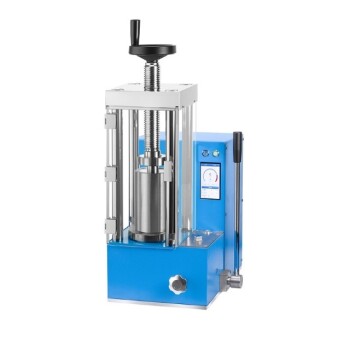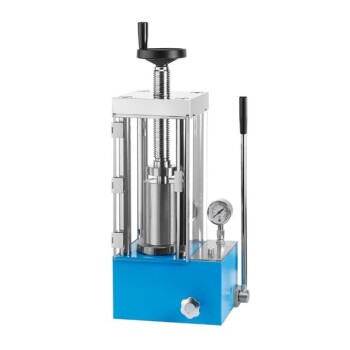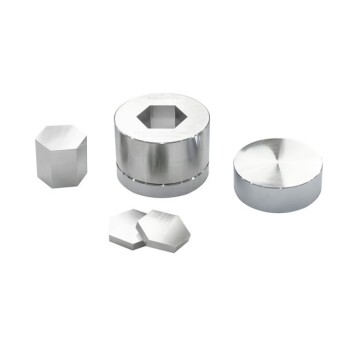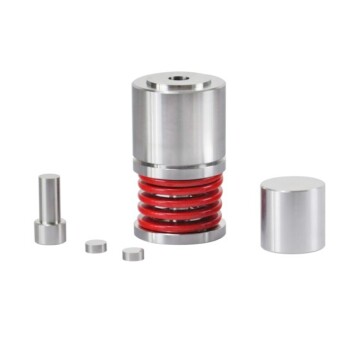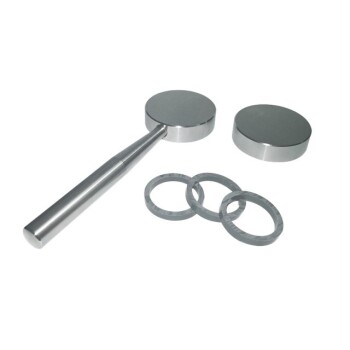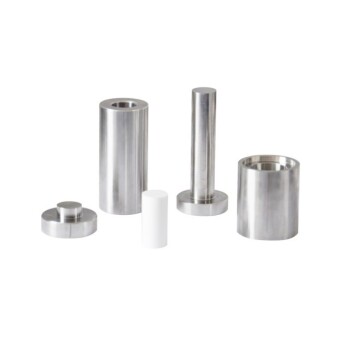At its core, Cold Isostatic Pressing (CIP) is a foundational process for creating dense, uniform components from powders. It is widely used in powder metallurgy for manufacturing parts from refractory metals, producing high-purity sputtering targets for the electronics industry, and forming critical automobile components. The process is also essential for creating advanced ceramics, carbides, and composites where consistent material properties are non-negotiable.
The fundamental value of CIP lies in its ability to apply perfectly uniform pressure from all directions. This unique characteristic eliminates the density gradients common in other compaction methods, resulting in stronger, more predictable parts, especially for complex shapes or high-performance materials.
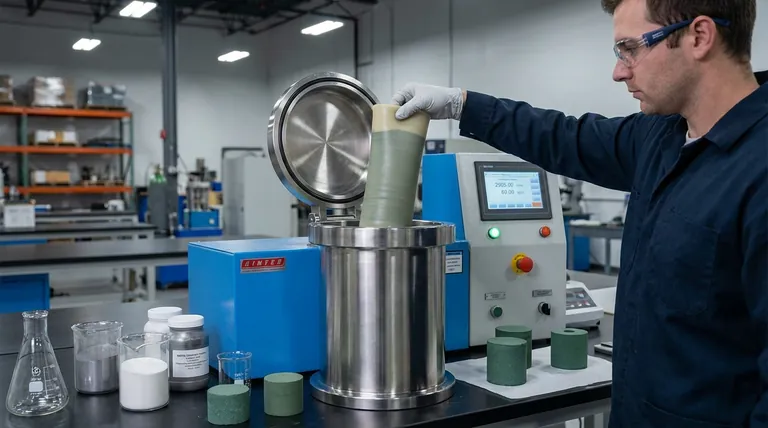
How CIP Achieves Unmatched Uniformity
Cold Isostatic Pressing is not simply about squeezing powder; it is a sophisticated method designed to achieve a level of consistency that other techniques cannot match. Its success is rooted in a basic principle of physics applied with engineering precision.
The Principle of Isostatic Pressure
The process operates on Pascal's Law, which states that pressure applied to an enclosed fluid is transmitted undiminished to every portion of the fluid and the walls of the containing vessel.
In CIP, the "vessel" is a flexible, elastomer mold (made of rubber, urethane, or PVC) filled with the raw material powder. By submerging this sealed mold in a liquid and pressurizing that liquid, the force is applied equally to every point on the mold's surface, compressing the powder uniformly from all sides.
The "Green Body" Advantage
The output of the CIP process is a compacted, pre-sintered part known as a "green body." This component has a high "green strength," meaning it is solid and robust enough to be handled, machined, or transported before the final heating step (sintering).
This high green strength is a direct result of the uniform density achieved during pressing. With no internal weak spots or density variations, the green body is far less prone to cracking or breaking.
Key Industrial Applications in Detail
The unique benefits of CIP make it the preferred method for a range of demanding applications where material failure is not an option.
Powder Metallurgy and Refractory Metals
CIP is crucial for working with refractory metals like tungsten, molybdenum, and tantalum. These materials have extremely high melting points, making traditional casting impractical or impossible.
Powder metallurgy, initiated by CIP, allows for the creation of dense, near-net-shape parts from these metals at room temperature, which are then sintered to achieve their final properties.
High-Performance Ceramics and Sputtering Targets
In advanced ceramics, achieving near-theoretical density is vital for mechanical strength and electrical performance. CIP excels at this, eliminating internal pores that can become failure points.
A prime example is the manufacturing of sputtering targets, such as indium tin oxide (ITO). CIP can produce ceramic targets with densities up to 95%, ensuring uniformity critical for the thin-film deposition process in manufacturing screens and electronics.
Automotive and Aerospace Components
The reliability of automotive parts like bearings and oil pump gears is directly tied to their material strength and fatigue resistance.
CIP produces components with a uniform microstructure, free from the internal stresses found in parts made by uniaxial (single-direction) pressing. This results in superior durability and a longer operational lifespan.
Advanced and Niche Materials
The versatility of CIP allows it to be used for a wide spectrum of materials beyond metals and ceramics. This includes specialized plastics, graphite, carbides for cutting tools, and various composite powders.
Understanding the Trade-offs
While powerful, CIP is a specific tool chosen for its distinct advantages. Understanding its trade-offs is key to applying it correctly.
Core Benefit: Superior Material Properties
The primary reason to choose CIP is for the end result: unmatched density, uniformity, and strength. This leads to predictable shrinkage during sintering and enhanced mechanical properties like ductility and corrosion resistance in the final part.
Core Benefit: Geometric Freedom
Because pressure is applied from all directions, CIP can produce complex or very large shapes that are difficult or impossible to form with unidirectional presses. It avoids the friction with die walls that can cause density variations in other methods.
The Primary Limitation: Cycle Time and Tooling
The main trade-off with CIP is process speed. Filling and sealing the flexible molds, placing them in the pressure vessel, and running the pressure cycle can be slower than high-speed die compaction. The flexible tooling is also more complex than the simple punch-and-die sets used in other methods.
Making the Right Choice for Your Goal
Deciding whether to use Cold Isostatic Pressing depends entirely on your project's final requirements for performance and complexity.
- If your primary focus is material performance: Use CIP when you need maximum density, strength, and uniformity, especially for high-performance metals and advanced ceramics.
- If your primary focus is creating complex or large shapes: CIP is ideal for components that are challenging or impossible to form with traditional unidirectional pressing.
- If your primary focus is high-volume production of simple parts: You may find that faster methods like uniaxial pressing offer a better balance of cost and speed, assuming the slight compromise in density is acceptable.
Ultimately, CIP is the definitive choice when the structural integrity and uniformity of the final component cannot be compromised.
Summary Table:
| Application Area | Key Uses | Benefits |
|---|---|---|
| Powder Metallurgy | Refractory metals (tungsten, molybdenum), automotive parts | High density, uniform microstructure, superior strength |
| Electronics | Sputtering targets (e.g., ITO) | Up to 95% density, essential for thin-film deposition |
| Advanced Ceramics | Carbides, composites | Eliminates pores, enhances mechanical and electrical properties |
| Aerospace & Automotive | Bearings, oil pump gears | Improved fatigue resistance, longer lifespan |
Ready to enhance your lab's capabilities with precise and reliable pressing solutions? KINTEK specializes in lab press machines, including automatic lab presses, isostatic presses, and heated lab presses, designed to meet the demanding needs of laboratories in materials science, electronics, and automotive industries. Our equipment ensures uniform density and superior performance for your critical components. Contact us today to discuss how we can support your projects with cutting-edge technology and expert guidance!
Visual Guide
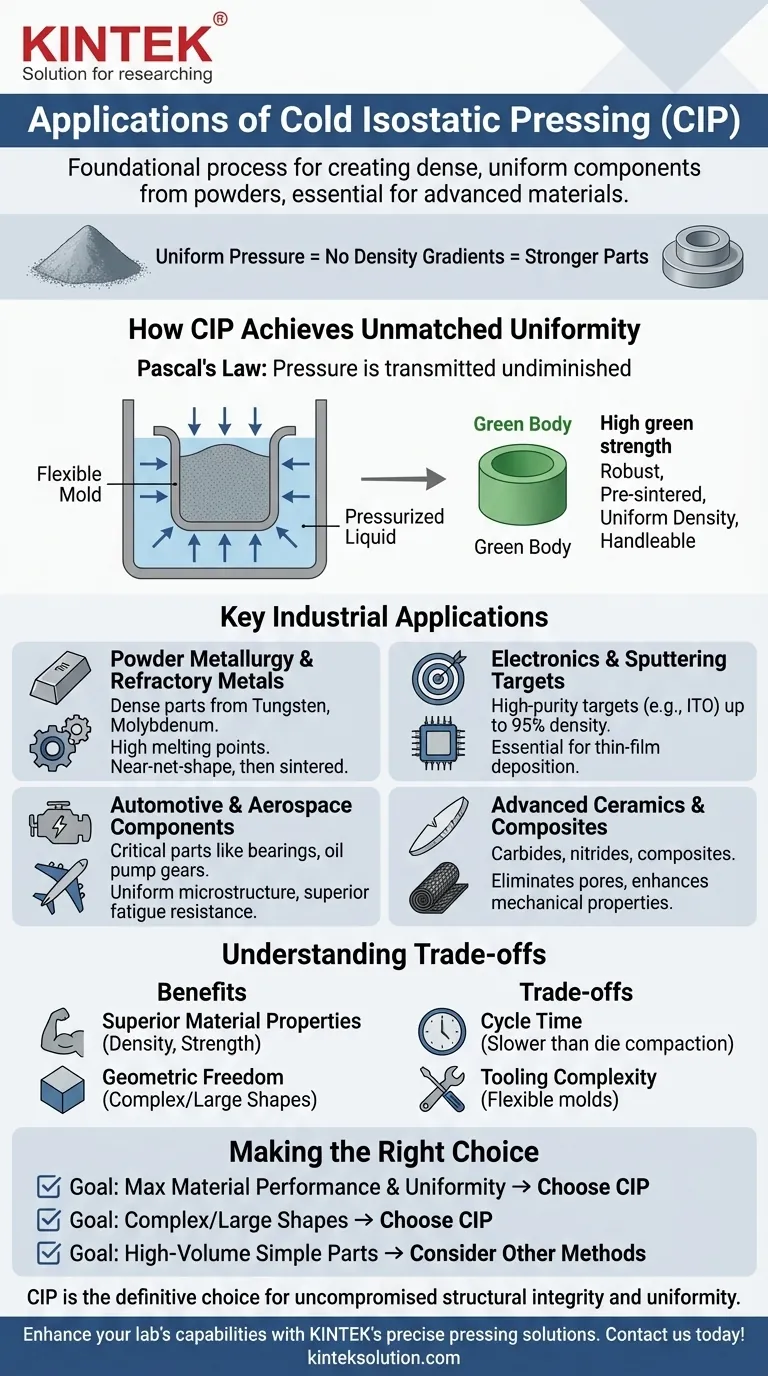
Related Products
- Electric Lab Cold Isostatic Press CIP Machine
- Electric Split Lab Cold Isostatic Pressing CIP Machine
- Manual Cold Isostatic Pressing CIP Machine Pellet Press
- Automatic Lab Cold Isostatic Pressing CIP Machine
- Lab Polygon Press Mold
People Also Ask
- What are the characteristics of the isostatic pressing process? Achieve Uniform Density for Complex Parts
- What are the two main techniques used in cold isostatic pressing? Wet-Bag vs. Dry-Bag Methods Explained
- What is the specific function of a Cold Isostatic Press (CIP)? Enhance Carbon Inoculation in Mg-Al Alloys
- In which industries is CIP commonly applied? Discover Key Sectors Using Cold Isostatic Pressing
- What industries benefit from Cold Isostatic Pressing technology? Ensure Reliability in Aerospace, Medical, and More
